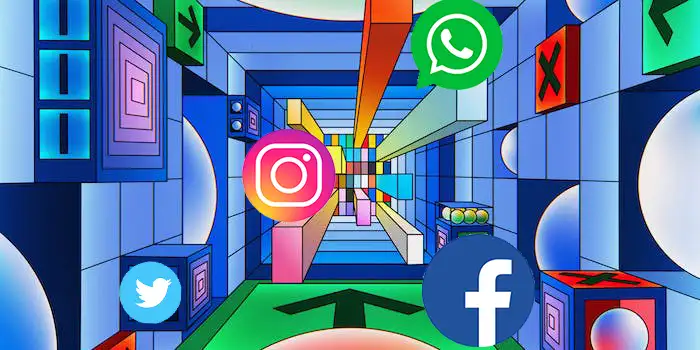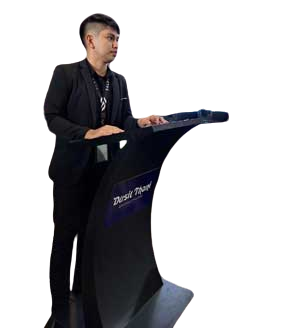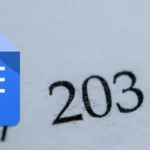Wait, why is my feed full of steak even though I’m a vegetarian? That’s often our reaction when we find ourselves scrolling through our feed and we see posts that we aren’t even interested in.
Also, certain accounts always seem to show up even though we don’t know them. The truth behind this is that it all lies in social media algorithms.
A social media algorithm is a mathematical technique that platforms employ to choose what material to show on a user’s feed. The algorithm takes into account aspects such as user behavior, content popularity, and other users’ interactions. By leveraging the algorithms, social media platforms can increase the engagement of users.
In this guide, you’ll learn:
What is Social media algorithm
Is there a point in your life when you’ve ever wondered why your favorite social media app is showing you this kind of post?
Why it’s about traveling even though you don’t have plans to travel and all you want to see is a post about what’s happening in politics? Well, it’s about social media algorithms.
So what exactly is social media algorithm about? Actually, it’s just a fancy term for a computer program that’s very complicated if you know nothing about codes. This algorithm is responsible for determining what content will show on your feed.
But there are a ton of factors that this algorithm will consider and different social media platforms have different algorithms.
The algorithm of Facebook is different from the algorithm of Twitter because social media platforms have a different approaches on how they will improve user engagement on their platform.
So what are the factors that need to be considered? Things like how you’ve engaged in the past, what are your friends like, and what kind of content is very popular at the moment.
So in short, the app is trying to read your mind and analyze your behavior. Then they will show you what you want to see.
Let me give you an example: If a user frequently uses Instagram to view beautiful animals, the Instagram algorithm will try to understand your use patterns and present you with more content the next time you open the app.
But wait, there are times that you’re sure that you haven’t engaged in these kinds of content but the algorithm will show you some posts about it, why is that? Well, the algorithm isn’t perfect.
There are times that I see accounts or posts that I don’t follow or I’ll miss some posts from an account that I do follow.
That’s because algorithms are always changing and sometimes they commit mistakes.
But overall, the goal of social media algorithms is to provide us with content that will be enjoyable and engaging because social media platforms aim to let us stay on their application for a long time.
How do social media algorithms work
Before I will explain it in general, I just want to share my own experience with you. I’m a big fan of fitness that’s why I love watching gym workouts on Youtube. What I usually do is follow a lot of fitness YouTubers on the platform.
But sometimes, I also want to watch videos about vegan diets that’s why I follow chefs who are expert on it. So the question is, how does the Youtube algorithm decide what videos to show me?
Here are some bullet points I can explain to you:
- The Youtube algorithm will analyze my watch and search history because they will know that I’m interested in fitness and a vegan diet based on what videos I’ve searched and watched in the past.
- The algorithm will also look at what channels or topics I subscribed to because once they know that I’m a subscriber to fitness and vegan, they will provide me with more videos about it.
- Based on the data that they have gathered, the algorithm will also suggest new videos for me to watch for or related topics about fitness and vegan. It might show me a new chest exercise or a vegan meal that’s similar to the one that I’ve watched before.
- The Youtube algorithm will also take into account how much engagement a video is getting. It means that if a video has a lot of views, likes, and comments from people with the same interest as me, there’s a chance that the algorithm is more likely to show that on my feed.
But wait social media algorithms are not just limited to Youtube. There are also other platforms such as Facebook, Instagram, and TikTok.
They all have their algorithm and it functions in similar ways but not exactly. Those platforms would still analyze your data or past behavior so that they know what content they will suggest for you.
Here are some bullet points that I want to provide you to explain how social media algorithms work in general:
- Social media algorithms analyze your likes, comments, and shares to determine what kind of content commonly engages.
- The algorithm will also observe what time of the day you’re using the app, what type of device you’re using, and your current location.
- Over time, the platform will learn and adapt. It means that they will get better at predicting what content they want to engage in.
- Often, an algorithm can be mistaken because it will be influenced by fake accounts and bots. This can lead to misinformation and fake news.
So that’s how social media works in general. It’s the simplest way I can explain how algorithms work because the technical kinds of stuff or computer programs are quite complicated.
Nevertheless, social media algorithm just wants to make our experience better but we still need to be aware of their limitations.
Why do social media platforms use algorithms
Social media needs to use algorithms because it’s like a DJ in a bar, they need to play the music that matches your vibe.
Just like how a DJ would mix a song to match the mood of the party, social media algorithms also show you contents that will match your interests.
I also consider social media algorithms like behind-the-scenes agents. They need to work hard just to make sure you see the things that you like and to keep you on the platform more engaged.
Let’s explore more reasons why social media uses algorithms:
- To help you find what you love: Social media platforms need to use algorithms to show you contents that you’ll enjoy based on what activities you’ve done in the past.
- To make sure you stay on their site: All social media platforms aim to let you stay on their sites for long periods. Through their algorithm, it will show you more engaging posts which will make you want to scroll for more!
- To ensure quality content: Algorithms are the ones responsible for providing us with high-quality and relevant content. It is also designed to prevent spam and low-quality content from appearing on our feed.
- To personalize your experience: Algorithms are designed to create a personalized experience for every user. This means that what you see on your feed is different from your friend’s feed. It always depends on your interests and behavior on the platform.
There was a time that I was scrolling through my social media feed and saw an ad for a new coffee shop that just opened around my area.
I was surprised by that ad because I’m not even interested in coffee and I don’t follow any coffee-related pages.
But then I realized that my Facebook algorithm detected my location that’s why it showed me a local ad based on my interests.
What is the impact of social media algorithms on users
The impact of social media algorithms on users is huge and it is both negative and positive.
I want to share with you some of my insights based on my own experiences. I’m a regular user of different social media sites and I can say that the algorithms aren’t perfect.
The following are some negative ways that social media algorithms have impacted many users:
- A lot of users believed they are in a “filter bubble” because algorithms are controlling what content they can only see based on their interests. For them, it felt like this will limit their exposure to other opinions.
- How algorithms work feels like it creates a sense of competition for some users especially when it comes to gaining attention. It felt like they need to create more content that will gain more likes and shares.
- Some users feel like their privacy is compromised because they know that the algorithm is analyzing their behavior and constantly tracking their location on the platform just to know what content to show them.
- Users aren’t comfortable if algorithms will show them harmful content such as fake news or hate speech.
On the other hand, social media algorithms can also have a positive impact by showing helpful content.
- Users have the chance to discover new learnings and communities that align with what they truly want. This can be empowering for them because it creates a sense of belonging.
- The algorithm can provide them with helpful information and resources such as the latest news about the Covid pandemic that they may not have seen yet.
- With the help of the algorithm, they can connect with others in a meaningful way or build relationships by sharing experiences.
As can be seen, the impact of social media algorithms on its users is nuanced and multidimensional.
If you believe the algorithm is delivering unfavorable stuff to you, you must first grasp how algorithms function. This is the only way for your social media to reflect your beliefs and aims.
Examples of social media algorithms
Since social media sites display material differently to users, each network employs a unique set of algorithms. It’s as if each classroom has a different instructor who teaches differently.
I’ll use popular social media platforms as examples and explain how their algorithms function.
1. Facebook
You can perform a lot of activities on Facebook that’s why their algorithm is also amazing when it comes to showing content to their users.
Their algorithm considers factors like engagement, relevance, and user’s past behavior. It uses an algorithm that determines which posts will appear in a user’s news feed.
2. Instagram
The Instagram algorithm uses an algorithm that determines the order of posts in a user’s feed. It has almost the same algorithm as Facebook because it is only owned by the same company, which is Meta.
3. Tiktok Algorithm
TikTok’s algorithm suggests videos to viewers on its For You Page. They consider a user’s involvement and viewing history.
They also take into account a user’s video metadata, including the noises, hashtags, and descriptions.
4. X (Formerly Twitter)
Twitter’s algorithm determines which tweet will appear at the top of a user’s timeline.
For example, if a user frequently interacts with tweets from a famous artist or a certain topic, the algorithm will show them more tweets related to that account or topic at the very top of their timeline.
Different platforms have different algorithms, but they aim to give users a tailored experience.
That’s one of their objectives because they want their users to enjoy staying on their site.
Final Thoughts
Because they are the sole ones in charge of determining what appears in our feeds, social media algorithms play a significant influence in our daily lives.
Despite their complexity, they serve our needs quite effectively.
In the end, it is preferable to comprehend social media algorithms so that we may use them to our advantage and make the majority of our social platforms enjoyable to browse.
The majority of the stuff that the algorithm has generated for you in your feed is ultimately dependent on your activity.










